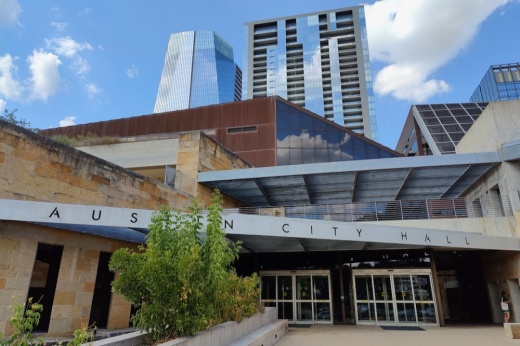"It is time for us to trust our voters," Mayor Kirk Watson said after City Council's Aug. 14 vote triggering a tax rate election.
By the numbers
Austin's tax rate will jump from $0.4776 to $0.574017 per $100 in property value—a more than 20% increase requiring voter authorization. A failed TRE would drop the rate to the highest level allowed without triggering an election.
The "typical" resident—defined by the city as owning a median-valued home with standard utility and service use—could expect to pay almost $420 more in the coming year under the council-approved spending plan. That increase includes about $300 more in taxes if voters support the higher rate.
If a TRE fails, the base FY 2025-26 budget would cost the typical homeowner about $220 more including a $105 higher tax bill.
Those calculations account for lowered home values year to year, with Austin's median dropping from an estimated $524,082 for the current fiscal year to a projected $494,803.
The big picture
City leaders labeled this summer's budgeting process as the most challenging in recent memory as Austin faces widening shortfalls through the 2020s. A shortfall of tens of millions of dollars initially projected for fiscal year 2025-26, beginning in October, was covered from sources like city emergency reserves and an affordable housing fund in City Manager T.C. Broadnax's balanced budget proposed in July.
But most officials agreed more money is needed going forward given dwindling local tax collections, the expiration or loss of federal dollars and a state limit on how much added revenue cities can raise without voter approval.
Under those constraints, the council sought to secure more funding than the base budget included for various city services, headlined by homelessness response. That led to planning for a higher tax rate above the state-imposed cap that Austinites will accept or reject in a Nov. 4 tax rate election, or TRE.
The approach
Officials spent weeks debating how much of a tax hike they'd put to voters to fund their preferred homelessness, public health, public safety, parks, housing and cultural initiatives. They also forwarded several budget adjustments in those and other areas.
Elected officials threw varying degrees of support behind a TRE this summer. Council member Marc Duchen stated any tax hike needing voter approval is unnecessary, while most other council members backed higher tax rates to shore up a range of public programs.
Austinites were also divided on the budget and the need for more significant tax changes. Many residents and nonprofit advocates testifying to council this summer pushed for a TRE to maintain unstable city and social service funding, like homelessness programming. Others were opposed to accelerating Austin's cost of living to support a growing budget without deeper scrutiny and cuts.
In the end, officials passed a budget supported by a tax rate 5 cents above the voter-approval limit. That framework is headlined by millions of dollars for homelessness services, housing assistance, parks and public facilities, public health and safety, and other city services.
That added funding would also maintain emergency reserves in line with city policy—above 17% of general fund spending—for years, a central goal for several officials given future financial uncertainty.
A full list of council budget amendments that would be funded under the TRE can be viewed here. Some of those were shifted from ongoing to one-time spending as outlined here.
Regardless of the TRE outcome, the budget includes items like homeless shelter and rental assistance funding, park improvements, and 4% raises for most city employees—including council members and city management. Sworn police officers are in line for a 6% raise, and medics will receive a 3% raise under their labor agreements, while future firefighter wage adjustments will be determined through ongoing negotiations.
A quick note
Austin won't automatically revert to the base proposed budget if voters shoot down a greater tax increase this fall. Instead, city officials will reconsider the spending plan under a process set through a measure from council member Mike Siegel.
If the November election fails, City Council will reconvene and could cut both base budget items and TRE-funded additions "as it determines necessary." Siegel's measure notes that affordable housing, emergency response, wildfire and flood preparedness, social services and homelessness response, and parks operations could be impacted after a failed TRE.
The context
Voters around Texas have passed several municipal TREs since the state capped annual tax revenue increases starting in 2020. Elections called by other government entities like counties and school districts have seen varying results.
Austin was among the first Texas cities to call a TRE under the new limit, and a nearly 9-cent tax increase for the Project Connect transit initiative passed with 58% approval in November 2020. At least four other city-level TREs have passed, with Mesquite, Cibolo and Copperas Cove voters approving tax hikes between 2021-24.
It remains to be seen how Austin voters respond this fall as the local tax burden continues to rise.
The city, Austin ISD and Austin Community College had nearly $3.6 billion in combined bond propositions approved in 2022, including Austin's $350 million affordable housing bond, with that debt adding to those entities' tax bills for years. And last fall, voters passed separate TREs for Travis County-led child care programming and AISD district staff raises and operations.
This year, Austin's TRE will appear on the ballot while Travis County's tax rate also moves above the voter-approval limit to cover expenses from its response to July's flooding. However, that increase won't require voter approval due to disaster declarations, and the rate will be lowered again next year.
Looking ahead, Austin's next bond is being prepared for a November 2026 vote. That remains in development, and city staff have recommended a comprehensive package totaling less than $700 million.





